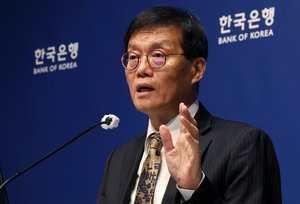Despite 2.5% rate freeze, local won slips to six-month low per dollar

The Bank of Korea’s monetary policy board held its base interest rate steady at 2.5 percent for the third consecutive meeting due to uncertainties surrounding the heated property market and the weakening valuation of the local currency. The won further dipped to its weakest level since April during Thursday’s trading.
The rate freeze was supported by five out of six members of the monetary policy board, excluding BOK Gov. Rhee Chang-yong, whose individual vote is not disclosed. One of the six members suggested bringing down the rate by 0.25 percentage point.
With the latest decision, the policy rate has remained unchanged for the past five months. The BOK has maintained its rate at 2.5 percent since May, taking a pause on its rate-cut cycle.
The move reflects the central bank’s cautious stance amid lingering uncertainties in the heated real estate market in the greater Seoul area.
“A rate cut could accelerate risks in the real estate market,” Rhee said at a press conference held at the central bank, shortly after the rate-setting meeting.
“Although the central bank has kept the base rate unchanged, it remains in a rate-cutting cycle. But it is likely to proceed cautiously, keeping the pace of the cuts limited.”
Recent volatility in the won-dollar exchange rate, driven by uncertainty over the country’s tariff negotiations with the US, also supported the decision to keep the rate on hold.
The won weakened during trading on Thursday to as low as 1,440.30 per dollar as of press time, diving to its weakest level since April 29. The nosedive follows the foreign exchange authorities’ joint verbal intervention executed earlier this month.
“Since the rate-setting meeting in August, the won has weakened by more than 30 won per dollar,” Rhee said.
“About one-quarter of this movement is driven by the dollar, while the remaining three-quarters reflect regional and domestic factors, including the weakened yuan from the US-China tensions, Japan’s expansive monetary policies leading to a weaker yen, and Korea’s US investments and tariff talks.”
He added that a successful outcome in the Korea-US trade talks could boost the value of the local currency.
Market analysts shared a mixed outlook on the timing of the next rate cut. Some expect the BOK to slash the rate at its next meeting in November, while others predict the move could be delayed until early next year.
“If the volatility in the property market and exchange rate can ease quickly, a November rate cut could be possible,” Choi Ji-wook, analyst at Korea Investment & Securities, said.
“Considering the recent circumstances of the real estate market, the likelihood of keeping the rate on hold through the end of this year has increased. Any additional rate cut is expected to be delayed until the first quarter of next year,” Kiwoom Securities analyst Ahn Ye-ha said.
silverstar@heraldcorp.com







